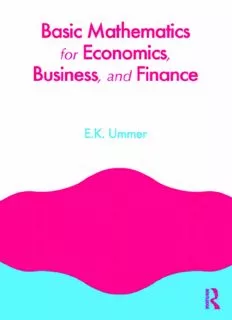
Basic Mathematics for Economics, Business and Finance PDF
Preview Basic Mathematics for Economics, Business and Finance
Basic Mathematics for Economics, Business, and Finance Thisbookcanhelpovercomethewidelyobservedmath-phobiaandmath-aversionamong undergraduate students in economics, business, and finance. The book can also help them understandwhytheyhavetolearndifferentmathematicaltechniques,howthesetechniques canbeapplied,andhowthetechniqueswillequipthestudentsintheirfurtherstudies. Thebookprovidesathoroughbutlucidexpositionofmostofthemathematicaltechniques appliedinthefieldsofeconomics,business,andfinance.Thebookdealswithtopicsfromhigh schoolmathematicstorelativelyadvancedareasofintegralcalculus,alsocoveringsubjects such as linear algebra, differential calculus, classical optimization, linear and nonlinear programming,andgametheory. Though the book directly caters to the needs of undergraduate students in economics, business,andfinance,graduatestudentsinthesesubjectswillalsofindthebookaninvalu- able text for supplementary reading. The website of the book – www.emeacollege.ac.in/ bmebf – provides supplementary materials and further chapters on difference equations, differential equations, elements of Mathematica®, and graphics in Mathematica®. The websitealsoprovidesmaterialsontheapplicationsofMathematica® throughoutthebook, aswellasteacherandstudentmanuals. E.K.UmmergraduatedwithaPh.D.degreefromtheUniversityofLondon.Heiscurrently an Assistant Professor at the Department of Economics of E.M.E.A. College of Arts and Science. Prior to joining E.M.E.A. College, he was with the faculty of Economics and Management Studies at International Islamic University, Malaysia. His current research interests are quantitative methods, economic theory, and economics of development and growth. [16:17 10/11/2011 5640-Ummer-FM.tex] JobNo:5640 UMMER:BasicMathematicsforEconomics,BusinessandFinance Page:i i–xiii Basic Mathematics for Economics, Business, and Finance E. K. Ummer [16:17 10/11/2011 5640-Ummer-FM.tex] JobNo:5640 UMMER:BasicMathematicsforEconomics,BusinessandFinance Page:iii i–xiii Firstpublished2012 byRoutledge 2ParkSquare,MiltonPark,Abingdon,Oxon,OX144RN SimultaneouslypublishedintheUSAandCanada byRoutledge 711ThirdAvenue,NewYork,NY10017 RoutledgeisanimprintoftheTaylor&FrancisGroup,aninformabusiness ©2012E.K.Ummer TherightofE.K.Ummertobeidentifiedasauthorofthisworkhasbeenasserted byhiminaccordancewithsections77and78oftheCopyright,Designsand PatentsAct1988. Allrightsreserved.Nopartofthisbookmaybereprintedorreproduced orutilisedinanyformorbyanyelectronic,mechanical,orothermeans, nowknownorhereafterinvented,includingphotocopyingandrecording, orinanyinformationstorageorretrievalsystem,withoutpermissionin writingfromthepublishers. Trademarknotice:Productorcorporatenamesmaybetrademarksor registeredtrademarks,andareusedonlyforidentificationand explanationwithoutintenttoinfringe. BritishLibraryCataloguinginPublicationData AcataloguerecordforthisbookisavailablefromtheBritishLibrary LibraryofCongressCataloging-in-PublicationData Ummer,E.K. Basicmathematicsforeconomics,business,andfinance/E.K.Ummer. p.cm. Includesbibliographicalreferencesandindex. 1.Economics–Mathematicalmodels.2.Programming(Mathematics)I.Title. HB135.U442011 330.01’51–dc23 2011019188 ISBN:978-0-415-66419-6(hbk) ISBN:978-0-415-66420-2(pbk) ISBN:978-0-203-81732-2(ebk) TypesetinTimesNewRomanbyCenveoPublisherServices [16:17 10/11/2011 5640-Ummer-FM.tex] JobNo:5640 UMMER:BasicMathematicsforEconomics,BusinessandFinance Page:iv i–xiii Dedicatedtomyparents,mywife,mysons,andallothersinmyfamily [16:17 10/11/2011 5640-Ummer-FM.tex] JobNo:5640 UMMER:BasicMathematicsforEconomics,BusinessandFinance Page:v i–xiii Contents Preface viii Acknowledgments xi 1 Reviewofbasics 1 2 Linearalgebra:vectorsandmatrices 69 3 Differentialcalculus 128 4 Classicaloptimization 193 5 Linearprogramming 244 6 Nonlinearprogramming 316 7 Gametheory 353 8 Integralcalculus 420 Notes 468 Bibliography 470 Index 472 Greekalphabet 484 [16:17 10/11/2011 5640-Ummer-FM.tex] JobNo:5640 UMMER:BasicMathematicsforEconomics,BusinessandFinance Page:vii i–xiii Preface This book grew out of the lecture notes I gave to students in undergraduate programs in economics,business,andfinanceformorethanadecadeatdifferentinstitutionsindifferent countries.Thebookcanbeadoptedeitherwhollyorpartiallyforundergraduateorbeginning graduate programs in these subjects. The only prerequisite, I assume, to follow the topics coveredinthisbookisabitofpatience. It will not be an exaggeration if one states that mathematics has become the language ofeconomics.Thestatesofaffairsinrelatedsubjectssuchasbusinessandfinancearenot much different. Most of the beginning undergraduate programs in these subjects mainly apply geometric tools for the exposition of relationships and theories. But, as the courses progress,theinherentlimitationsofthegeometrictoolsnecessitateashiftfromthemtomore generalalgebraicforms.Thisshiftcallsforatraininginsomeofthetechniquesandtoolsof mathematics. I have found from experience that an alarmingly large proportion of the students who enroll in undergraduate programs in economics, business, and finance in particular (and socialscienceingeneral)possesssomedegreeof“math-phobia”and“math-aversion.”These feelings, I believe, have their root in the unpropitious presentation of the subject to them. Althoughthebooksthathavebeenwrittenonmathematicsforthesesubjectsareallexcellent intheirownrespects,manyofthemstillcontinuetheunpropitiousformofpresentation.Many ofthesebooksfolloweitheranotoriouslytechnicaloroversimplifiedapproachmakingthe subject esoteric or humdrum. My aim, through an intermediate approach, is an auspicious presentation of the subject so that the feelings of phobia and aversion can be replaced by passionandappreciation.Therefore,Iattempttopresenttoundergraduatesinthesesubjects throughthisbookwhytheyneedtolearnallthemathematicaltechniquesexpectedofthem; theimportanceofthesetechniquesandtheirinterrelationships;andhowthesetechniquesare appliedintheirsubjects.Ibelievethatthisapproachwillmakethemappreciatemathematics and,thereby,helpthemunderstandtheirsubjectsproperly. Most of the graduate programs in economics, business, and finance apply mathematical techniquesandtoolsthatarefarbeyondthelevelsofthosecoveredinthisbook.Similarly, most journals (even those considered to be applied in nature) appear with articles that contain high-level mathematics. I do not claim either that this book will be sufficient for graduatemathematicalrequirementsorthatitwillpreparestudentstoreadandunderstand thesaidarticles.But,Idoclaimthatthisbookissufficientforundergraduatemathematical requirementsanditcanbuildastrongfoundationforgraduatestudiesinthesesubjects,which willeventuallyhelpinthereadingandunderstandingofthejournalarticlesmentionedabove. Oneimportantfeatureofthebookisthatthecompletepresentationofdifferenttopicsis basedonintuition.SinceIbelievethatvisualaidssuchasgraphshelpstudentslearnfaster, [16:17 10/11/2011 5640-Ummer-FM.tex] JobNo:5640 UMMER:BasicMathematicsforEconomics,BusinessandFinance Page:viii i–xiii Preface ix Ihaveincludedthemthroughoutthebook.Thoughproofsoftheoremsandpropositionsare important and necessary for a proper understanding of mathematics, I believe that it will beinauspiciousandcounterproductivetoimposetheseproofsonalreadymath-phobicand math-averse students. They can learn these proofs once they understood the basics and if theyareinterestedinthem.Therefore,Ihavedeliberatelyomittedtheproofsofmostofthe theoremsandpropositions.Anotherfeatureisthatmostsubsectionsineverychapterofthe bookcontainanumberofnumericalexamples.Moreover,mostmajorsectionsofthebook containapplicationexamplesandexercisesfromdifferentbranchesofeconomics,business, andfinance.Althoughtheexamplesinthebookaredrawnprimarilyfromthesesubjects,the mainbodyofthebookcanbesuccessfullyadopted(throughsuitableselectionofexamples) insimilarprogramsinsubjectssuchaspoliticalscience,psychology,lifesciences,etc. Thebookisorganizedintoeightchapters.Ihaveattemptedtoincludeinthebookmostof themathematicaltechniquesandtoolsthatarenormallytaughtinundergraduateprograms ineconomics,business,andfinancethroughouttheworld.Ibelievethatareviewofsomeof thenecessarymathematicslearnedinschoolwillhelpstudentsmuchand,therefore,thefirst chapter of the book is devoted to this purpose. It covers most of the important topics that studentslearnedinschoolincludingbasicsofsets;numbersystem;exponents;logarithms; equations; inequalities; intervals; absolute values; functions; limits; continuity; sequences; series;andsumandproductsymbols. Thesecondchaptercoverslinearalgebra.Thischapterexploresmostofthetopicsinvectors andmatricesthatarerequiredbyundergraduateprogramsinthesubjectsmentionedabove. Specifically,itdiscussesthebasicsofvectorsandmatrices;vectorspaces;vectorandmatrix operations;determinants;inverse;rank;solutionstosystemsoflinearequations;andsome specialmatricesanddeterminants.Differentialcalculusisdiscussedinthethird chapter.It exploresdifferentiationandderivatives;differentiabilityoffunctions;rulesofdifferentiation; higher-order differentiation; curvature of curves; convex sets; transformation of functions andMaclaurinandTaylorseries;partialderivatives;differentials;totalderivatives;implicit differentiation;etc. Since static optimization is crucial in the subjects of our interest, chapters four through seven are set apart for this topic. The fourth chapter is on classical optimization, which is primarilyconcernedwiththeapplicationoflinearalgebraanddifferentialcalculuscovered in the second and third chapters, respectively. It begins with a discussion of optima and extrema of univariate functions and progresses through their differential versions; optima of multivariate functions and their extensions; and optimization with equality constraints and its extensions. The fifth chapter is devoted to linear programming. The topics covered in this chapter include graphical approach; the tabular and matrix approaches of the simplex method; the revised simplex method; duality and sensitivity analyses; the dual simplexmethod;transportationandassignmentproblems;etc.Thenonlinearprogramming approachtooptimizationiscoveredinthesixthchapter.Topicssuchasgeometricformsof nonlinearobjectivefunctionsandconstraints;geometricandalgebraicsolutionstononlinear programming problems; and concave, quasiconcave, and quadratic programming are dealt with in this chapter. Another important topic of static optimization, namely game theory, is dealt with in the seventh chapter. It presents topics including static games of complete andperfectinformation;dominantanddominatedstrategies;Nashequilibrium;mixedand maximin strategies; dynamic games of complete and perfect information; extensive form representations;subgameperfectNashequilibrium;repeatedgames;etc. Thelast,andtheeighth,chapterofthebookisdevotedtothepresentationofoneofthe tools of dynamic analysis, namely integral calculus. This chapter introduces the meaning [16:17 10/11/2011 5640-Ummer-FM.tex] JobNo:5640 UMMER:BasicMathematicsforEconomics,BusinessandFinance Page:ix i–xiii x Preface ofintegration;therelationshipbetweenintegrationanddifferentiation;indefiniteintegrals; rulesofintegration;initialvalueproblems;partialandmultipleintegrals;definiteintegrals andthefundamentaltheoremofintegralcalculus;areasunderandbetweencurves;definite partialandmultipleintegrals;andimproperintegrals. Ihadplannedtoincludeinthebook,alongwithafewsupplementarytopicsintheexisting chapters,exclusivechaptersondifferenceequationsanddifferentialequations.Twoissues compelledmetoexcludethemfromthebook.Onewas,ofcourse,thespaceconstraint.The otherwasthefactthattheseexcludedtopicsarenotwidelycoveredinmostundergraduate programsinthesubjectsofourinterest.However,Ihavepreparedthesesupplementarytopics andthetwochaptersondifferenceequationsanddifferentialequations,whichcanbefound atthebook’swebsite:www.emeacollege.ac.in/bmebf.Interestedreaderscanaccessanduse themforlearningpurposes. IhadalsoplannedtointegrateMathematica®,oneoftheworld’smostversatilesoftware packages,intothebook.Mathematicaisahighlyadvancedcomputationalsoftwarepackage. Itisbeyonddoubtthatitcanfacilitatestudents’learningofmathematics.Allthefiguresin thisbookaregeneratedinMathematica.But,again,spaceconstraintsforcedmetoexclude it from the book. These materials include exclusive chapters on elements of Mathematica andgraphicsinMathematica.TheyalsoincludetheapplicationsofMathematicainmostof thetopicscoveredinthebookandindifferenceanddifferentialequations.Thesematerials can also be found at the website mentioned above and interested readers can use them for learningpurposes. ThewebsitealsocontainsteachingaidssuchasPowerPointandoverheadprojectorslides; aninstructor’smanual;andastudentsolutionmanual. E.K.Ummer [email protected] [16:17 10/11/2011 5640-Ummer-FM.tex] JobNo:5640 UMMER:BasicMathematicsforEconomics,BusinessandFinance Page:x i–xiii Acknowledgments Toacertainextent,thisbookisanoutcomeofcooperation.Severalpeoplehavecooperated in many ways during the past few years by providing support, encouragement, guidance, advice,andlove.Itiscertainlyapleasuretoacknowledgemydebttothem. ThisbookgrewoutofthelecturenotesIgavetoundergraduatestudentsinmathematicsfor economics,business,andfinanceatdifferentinstitutionsindifferentcountries.Knowingly orunknowingly,manyofthesestudentshavecontributedgreatlytothecontentsofthebook. Iamthankfultothemall. Myinstitution,EMEACollegeofArtsandScience,andmycolleagueshavebeenaconstant source of support and inspiration. Special thanks are due to Professor K. Abdul Hameed (College Principal); Professor K. Hamza and my other colleagues at the Department of Economics;T.V.Zacharia,AssistantProfessorandHead,DepartmentofPoliticalScience; andV.AbdulMuneer,AssistantProfessorandHead,DepartmentofJournalism.Iamalso thankful to A.M. Riyad, Assistant Professor and Head, Department of Computer Science; andtoK.Muhammedali,CollegeSuperintendent. ProfessorP.Mohammed,Head,DepartmentofMathematics,haspatientlyreviewedthe entire manuscript of the book. His suggestions and comments have certainly improved its contents.Iamindebtedtohim. ItwasagreatpleasuretodealwiththeconcernedofficialsatRoutledge,Taylor&Francis Group,allthewayfromtheproposalofthebooktoitspresentform.Inparticular,Imention Ms. Lam Yongling, Associate Editor, Routledge. She has been highly cooperative and considerate,andIamgratefultoherandallothersconcernedatRoutledge. Mywife,Ani,andmysons,KittuandKuttu,haveextendedmeunstintedencouragement andsupportrightfromtheinceptionoftheideaofwritingthebookuntilnow.Theymissed mealotwhileIwasworkingawayonthebook.AlthoughIcannotrepaythemwhatislost, Ilovethemanddedicatethebooktothemandtoallothersinmyfamily. [16:17 10/11/2011 5640-Ummer-FM.tex] JobNo:5640 UMMER:BasicMathematicsforEconomics,BusinessandFinance Page:xi i–xiii
